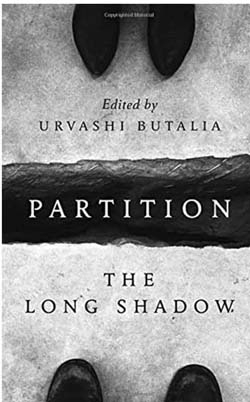The book under review, Partition: The Long Shadow, delving into the notions of ‘foreignness’ and ‘belonging’, focuses upon three significant themes: one, it brings back the peripheral regions of the subcontinent, e.g., Assam, Sindh, and Ladakh, into the academic discussion on Partition; two, it gives voice to the second and third generation memories of the event; and three, it suggests a larger study of the psychological aftermath of Partition.
Urvashi Butalia introduces the book by sharing her experience of attending the al Nakba in Ramallah in 2011. Drawing the parallel with Partition, Butalia says, which largely expresses the objective behind this volume: ‘…over the years, its memories have become more complex, acquired more nuance and layers… Further, as the number of those who retain direct, experiential memories diminish, as their stories recede, ways of remembering also change, the filters through which such memories are passed on— whether in and through literature, or music, or art and so much more—now begin to shape how they are passed on’ (p. viii) (emphasis original).

